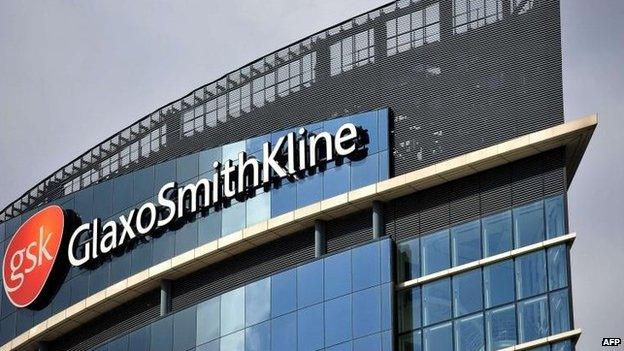GlaxoSmithKline fined $490m by China for bribery
- Published

GSK is one of the world's biggest drug producers but has come under scrutiny in China
China has fined UK pharmaceuticals firm GlaxoSmithKline $490m (£297m) after a court found it guilty of bribery.
The record penalty follows allegations the drug giant paid out bribes to doctors and hospitals in order to have their products promoted.
The court gave GSK's former head of Chinese operations, Mark Reilly, a suspended three-year prison sentence and he is set to be deported.
Other GSK executives have also been given suspended jail sentences.
The guilty verdict was delivered after a one-day trial at a court in Changsha, according to the Xinhua news agency.
Chinese authorities first announced they were investigating GSK in July last year, in what has become the biggest corruption scandal to hit a foreign firm in years. The company was accused of having made an estimated $150m in illegal profits
GSK said it had "published a statement of apology to the Chinese government and its people".
"Reaching a conclusion in the investigation of our Chinese business is important, but this has been a deeply disappointing matter for GSK," said chief executive Sir Andrew Witty in a statement., external
"We have and will continue to learn from this. GSK has been in China for close to a hundred years and we remain fully committed to the country and its people," he said.
"We will also continue to invest directly in the country to support the government's health care reform agenda and long-term plans for economic growth."
Mick Cooper, analyst at Edison Investment Research in London, said: "GlaxoSmithKline will hope that this will draw a line under events in China, but it will take time for its Chinese commercial operations to recover."

Analysis: Carrie Gracie, BBC China editor
This is a humiliating outcome for one of Britain's biggest companies: pleading guilty to systematic bribery, facing the biggest fine in Chinese history and making an abject apology to the Chinese government and people.
But after a case lasting more than a year, there was no easy way out for GSK, and at least now, it can start to rebuild its battered brand in China.
Today GSK said it had learned its lessons, and one of those is clearly that foreign companies need to keep a close eye on China's fast changing political and regulatory weather if they are to prosper, or even survive, in this promising but perilous market.

- Published11 August 2014

- Published4 July 2014
- Published16 July 2013